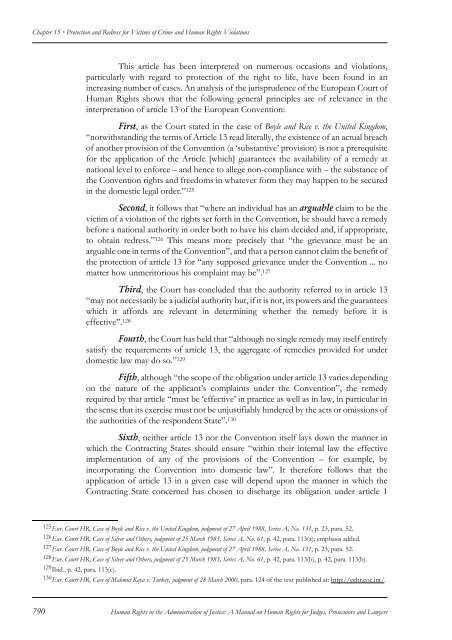protection and redress for victims of crime and human rights violations
protection and redress for victims of crime and human rights violations
protection and redress for victims of crime and human rights violations
You also want an ePaper? Increase the reach of your titles
YUMPU automatically turns print PDFs into web optimized ePapers that Google loves.
Chapter 15 • Protection <strong>and</strong> Redress <strong>for</strong> Victims <strong>of</strong> Crime <strong>and</strong> Human Rights ViolationsThis article has been interpreted on numerous occasions <strong>and</strong> <strong>violations</strong>,particularly with regard to <strong>protection</strong> <strong>of</strong> the right to life, have been found in anincreasing number <strong>of</strong> cases. An analysis <strong>of</strong> the jurisprudence <strong>of</strong> the European Court <strong>of</strong>Human Rights shows that the following general principles are <strong>of</strong> relevance in theinterpretation <strong>of</strong> article 13 <strong>of</strong> the European Convention:First, as the Court stated in the case <strong>of</strong> Boyle <strong>and</strong> Rice v. the United Kingdom,“notwithst<strong>and</strong>ing the terms <strong>of</strong> Article 13 read literally, the existence <strong>of</strong> an actual breach<strong>of</strong> another provision <strong>of</strong> the Convention (a ‘substantive’ provision) is not a prerequisite<strong>for</strong> the application <strong>of</strong> the Article [which] guarantees the availability <strong>of</strong> a remedy atnational level to en<strong>for</strong>ce – <strong>and</strong> hence to allege non-compliance with – the substance <strong>of</strong>the Convention <strong>rights</strong> <strong>and</strong> freedoms in whatever <strong>for</strong>m they may happen to be securedin the domestic legal order.” 125Second, it follows that “where an individual has an arguable claim to be thevictim <strong>of</strong> a violation <strong>of</strong> the <strong>rights</strong> set <strong>for</strong>th in the Convention, he should have a remedybe<strong>for</strong>e a national authority in order both to have his claim decided <strong>and</strong>, if appropriate,to obtain <strong>redress</strong>.” 126 This means more precisely that “the grievance must be anarguable one in terms <strong>of</strong> the Convention”, <strong>and</strong> that a person cannot claim the benefit <strong>of</strong>the <strong>protection</strong> <strong>of</strong> article 13 <strong>for</strong> “any supposed grievance under the Convention ... nomatter how unmeritorious his complaint may be”. 127Third, the Court has concluded that the authority referred to in article 13“may not necessarily be a judicial authority but, if it is not, its powers <strong>and</strong> the guaranteeswhich it af<strong>for</strong>ds are relevant in determining whether the remedy be<strong>for</strong>e it iseffective”. 128Fourth, the Court has held that “although no single remedy may itself entirelysatisfy the requirements <strong>of</strong> article 13, the aggregate <strong>of</strong> remedies provided <strong>for</strong> underdomestic law may do so.” 129Fifth, although “the scope <strong>of</strong> the obligation under article 13 varies dependingon the nature <strong>of</strong> the applicant’s complaints under the Convention”, the remedyrequired by that article “must be ‘effective’ in practice as well as in law, in particular inthe sense that its exercise must not be unjustifiably hindered by the acts or omissions <strong>of</strong>the authorities <strong>of</strong> the respondent State”. 130Sixth, neither article 13 nor the Convention itself lays down the manner inwhich the Contracting States should ensure “within their internal law the effectiveimplementation <strong>of</strong> any <strong>of</strong> the provisions <strong>of</strong> the Convention – <strong>for</strong> example, byincorporating the Convention into domestic law”. It there<strong>for</strong>e follows that theapplication <strong>of</strong> article 13 in a given case will depend upon the manner in which theContracting State concerned has chosen to discharge its obligation under article 1125 Eur. Court HR, Case <strong>of</strong> Boyle <strong>and</strong> Rice v. the United Kingdom, judgment <strong>of</strong> 27 April 1988, Series A, No. 131, p. 23, para. 52.126 Eur. Court HR, Case <strong>of</strong> Silver <strong>and</strong> Others, judgment <strong>of</strong> 25 March 1983, Series A, No. 61, p. 42, para. 113(a); emphasis added.127 Eur. Court HR, Case <strong>of</strong> Boyle <strong>and</strong> Rice v. the United Kingdom, judgment <strong>of</strong> 27 April 1988, Series A, No. 131, p. 23, para. 52.128 Eur. Court HR, Case <strong>of</strong> Silver <strong>and</strong> Others, judgment <strong>of</strong> 25 March 1983, Series A, No. 61, p. 42, para. 113(b), p. 42, para. 113(b).129 Ibid., p. 42, para. 113(c).130 Eur. Court HR, Case <strong>of</strong> Mahmut Kaya v. Turkey, judgment <strong>of</strong> 28 March 2000, para. 124 <strong>of</strong> the text published at: http://echr.coe.int/.790 Human Rights in the Administration <strong>of</strong> Justice: A Manual on Human Rights <strong>for</strong> Judges, Prosecutors <strong>and</strong> Lawyers
















